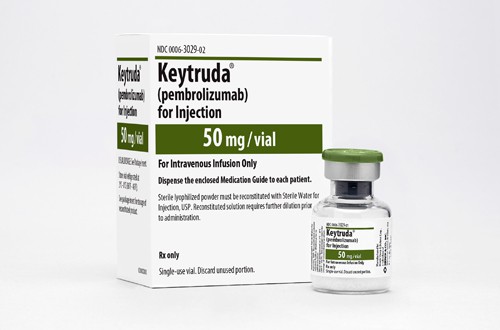
Merck & Co/MSD’s blockbuster anti-PD-1 therapy Keytruda has scored its third first-line approval for the treatment of non-small cell lung cancer (NSCLC) in China in less than a year.
The additional indication approval from China’s National Medical Products Administration (NMPA) was based on the results from the phase 3 KEYNOTE-407 study.
The study investigated Keytruda (pembrolizumab) in combination with chemotherapy treatments carboplatin and paclitaxel for the first-line treatment of metastatic squamous NSCLC.
The data from this trial showed that the Keytruda combination demonstrated a statistically significant improvement in overall survival and progression-free survival in NSCLC patients, compared to treatment with chemotherapy alone.
The Keytruda-chemotherapy combination reduced the risk of death by 36% compared to chemotherapy alone, and reduced the risk of disease progression or death by 44% compared to treatment with chemotherapy.
“This approval expands our current lung cancer indications in China to include KEYTRUDA in combination with chemotherapy in patients with squamous cell carcinoma, a particularly difficult-to-treat type of lung cancer,” said Jonathan Cheng, vice president, oncology clinical research, Merck Research Laboratories.
Lung cancer is the leading cause of cancer death in China, with more than 787,000 new cases of lung cancer diagnosed in China each year and more than 631,000 deaths caused by the disease.
NSCLC is the most common type of lung cancer, accounting for 85% of all new cases.
“In less than one year, we have received three first-line approvals for Keytruda, in combination with chemotherapy or as monotherapy, in non-small cell lung cancer,” said Joseph Romanelli, President of MSD in China.
“Keytruda, in combination with chemotherapy or as monotherapy, has demonstrated a significant survival benefit versus chemotherapy and we will continue to work closely with the external stakeholders to bring this important treatment option to patients,” he added.
As well as winning approvals in NSCLC, Keytruda also became the first drug in the class to be approved in China for advanced melanoma.
However, it was not the first PD-1 inhibitor to get a green light in the country – Bristol-Myers Squibb won that prize for Opdivo (nivolumab) in NSCLC back in 2018.
The increasing size and growth of China’s pharma market has made it a significant target for many big Western pharma companies, but the approval of new cancer immunotherapies has in the country has been slow.
The likes of BMS, Merck and AstraZeneca are quickly making up for lost time, however, with filings for approval in the largest therapy areas – such as NSCLC – now a regular occurrence.




